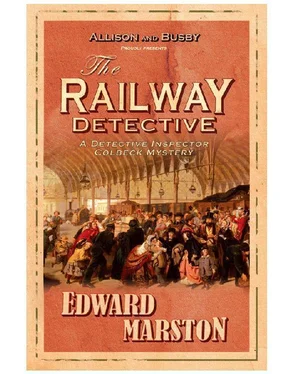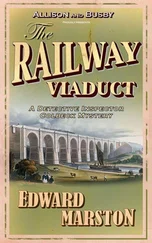Edward Marston - The Railway Detective
Здесь есть возможность читать онлайн «Edward Marston - The Railway Detective» весь текст электронной книги совершенно бесплатно (целиком полную версию без сокращений). В некоторых случаях можно слушать аудио, скачать через торрент в формате fb2 и присутствует краткое содержание. Жанр: Классический детектив, Исторический детектив, на английском языке. Описание произведения, (предисловие) а так же отзывы посетителей доступны на портале библиотеки ЛибКат.
- Название:The Railway Detective
- Автор:
- Жанр:
- Год:неизвестен
- ISBN:нет данных
- Рейтинг книги:4 / 5. Голосов: 1
-
Избранное:Добавить в избранное
- Отзывы:
-
Ваша оценка:
- 80
- 1
- 2
- 3
- 4
- 5
The Railway Detective: краткое содержание, описание и аннотация
Предлагаем к чтению аннотацию, описание, краткое содержание или предисловие (зависит от того, что написал сам автор книги «The Railway Detective»). Если вы не нашли необходимую информацию о книге — напишите в комментариях, мы постараемся отыскать её.
The Railway Detective — читать онлайн бесплатно полную книгу (весь текст) целиком
Ниже представлен текст книги, разбитый по страницам. Система сохранения места последней прочитанной страницы, позволяет с удобством читать онлайн бесплатно книгу «The Railway Detective», без необходимости каждый раз заново искать на чём Вы остановились. Поставьте закладку, и сможете в любой момент перейти на страницу, на которой закончили чтение.
Интервал:
Закладка:
‘That is certainly true.’
‘Then how did they know that you were only sending gold coin yesterday?’ wondered Leeming. ‘I have an uncomfortable feeling that someone found a way to get past all these steel doors of yours.’
The journey to Wolverhampton obliged Colbeck to travel second class on the Birmingham, Lancaster and Carlisle Railway. It took him through the heart of the Black Country and he looked out with dismay at the forges, mills, foundries, nail factories, coal mines and ironstone pits that stretched for miles beneath the curling dark smoke that spewed from a thousand brick chimneys. Cutting through the smoke, filling the sky with a fierce glare, were lurid flames from countless burning heaps of rubbish. Those who laboured for long hours in heavy industry were unacquainted with the light of day and vulnerable to hideous accidents or cruel diseases. Above the thunder of his train, Colbeck could hear the pounding of hammers and the booming explosion of a blast furnace.
Wolverhampton was a large, dirty, sprawling industrial town that was celebrated for the manufacture of locks, brass, tin, japanned wares, tools and nails. The immaculate detective looked rather incongruous in its workaday atmosphere. Given directions by the stationmaster, he elected to walk to his destination so that he could take a closer look at the people and place. By the time that he arrived at the Chubb Factory, he felt that he had the measure of Wolverhampton.
Silas Harcutt, the manager at the factory, could not understand why someone had come all the way from London to question him. He was a slim individual of middle height with the look of a man who had worked his way up to his position with a slowness that had left a residual resentment. Harcutt was abrupt.
‘Your visit is pointless, Inspector,’ he declared.
‘Not at all,’ said Colbeck. ‘I’ve always been curious to see the inside of the Chubb factory. I once had the privilege of a visit to the Bramah Works and it was a revelation.’
‘Bramah locks are nothing compared to ours.’
‘Your competitors would disagree. At the forthcoming Great Exhibition, they are to display a lock that is impossible to pick.’
‘We, too, will have our best lock on show,’ boasted Harcutt, ‘and we will challenge anyone to open it. I can tell you now that nobody will.’
‘You obviously have faith in your product.’
‘The Chubb name is a guarantee of quality.’
‘Nobody disputes that, Mr Harcutt,’ said Colbeck, ignoring the man’s brusque manner. ‘For professional reasons, I try to keep abreast of developments in the locksmith’s trade and I’m always interested to read about your progress. The railway safe that you devised was a marvel of its kind. Even so,’ he went on, ‘I fear that it was not able to prevent a consignment of money from being stolen.’
‘The locks were not picked,’ insisted the manager, huffily. ‘The safe is specifically designed so that a burglar has nothing to work upon but the keyholes with their protective internal barrels and the steel curtain at their mouths. Do not dare to blame us, Inspector. We were not at fault.’
‘I hope that turns out to be the case, sir.’
‘It is the case, Inspector. Let me show you why.’
Opening the door of his office, he led Colbeck down a corridor to a room that housed dozens of safes and locks. Harcutt walked across to a replica of the safe that the detective had seen on board the train.
‘You see?’ said the manager, patting the safe. ‘Far too heavy to lift without the aid of a crane and resistant to any amount of gunpowder. It is solid and commodious, able to carry a quarter of a ton of gold, coin, or a mixture of both.’
‘The robbers showed due respect for the Chubb name,’ said Colbeck. ‘Instead of trying to pick the locks, they opened them with the keys and the combination number. I am certain that they got neither from Spurling’s Bank and security at the Royal Mint is very tight.’
Harcutt was offended. ‘Are you suggesting that the keys came from here ?’ he said, drawing himself up to his full height. ‘I regard that as an insult, Inspector.’
‘It was not meant to be. If I may examine the keys to this safe, I can tell you at once whether there has been subterfuge in your factory.’
‘That is inconceivable.’
‘I must press you on this point,’ said Colbeck, meaningfully.
Lips pursed, Harcutt turned away and strode back to his office with the detective at his heels. He had to use two keys and a combination number to open the wall safe, making sure that he kept his back to his visitor so that Colbeck could see nothing of the operation. Extracting a metal box, the manager unlocked it with a third key and handed it over.
Colbeck took out the keys. Unable to detect anything suspicious with the naked eye, he brought his magnifying glass out again. He saw exactly what he had expected to find.
‘Minute traces of wax,’ he noted, offering the glass to the other man. ‘Would you care to confirm that, Mr Harcutt?’
The manager took the magnifying glass and peered through it with disbelief. Both keys had discernible specks of wax still attached to them.
‘Who else was authorised to open your safe?’ asked Colbeck.
‘Only two people. Mr Dunworth, my deputy, is one of them.’
‘And the other?’
‘Daniel Slender.’
‘I need to speak to both of them at once, Mr Harcutt.’
‘Of course,’ said the manager, grudgingly. ‘Mr Dunworth is in the next office. But you’ll have to wait until you get back to London before you question Mr Slender.’
‘Oh?’
‘He left some weeks ago to take up a new post there.’ He saw the suspicion in Colbeck’s eyes. ‘You are quite wrong, Inspector,’ he continued, shaking his head. ‘Daniel Slender could not possibly be the culprit. He has been with us for decades. For the last few years, he has been looking after his sick mother in Willenhall. When she died, he felt that it was time to move out of the Midlands.’ He thrust the magnifying glass at Colbeck. ‘I have complete trust in Daniel Slender.’
The frock coat fitted perfectly. He preened himself in front of the mirror for minutes. Daniel Slender had finally fulfilled his ambition to wear clothing that had been tailored for him in Bond Street. Tall and well-proportioned, he looked as if he belonged in such fine apparel. When he had changed back into his other suit, he took a wad of five pounds notes from his wallet and began to peel them off. Years of self-denial were behind him now. He had enough money to change his appearance, his place in society and his whole life. He was content.
CHAPTER SIX
It was early evening before Robert Colbeck finally got back to his office in Scotland Yard. Victor Leeming was waiting to tell him about his visit to the Royal Mint and to voice his suspicion that someone there might have warned the train robbers when gold coin was actually being dispatched to Birmingham. He took a positive delight in describing the processes by which gold bullion was transformed into coinage.
‘I have never seen such a large amount of money,’ he said.
‘No, Victor,’ remarked Colbeck. ‘The irony is that the men who sweat and strain to make the money probably get little of it in their wages. It is a cruel paradox. Workers who are surrounded by gold every day remain relatively poor. It must be a vexing occupation.’
‘A dangerous one as well, sir. Had I stayed in the refining shop any longer, the heat from those furnaces would have given me blisters. As it is, I can still smell those terrible fumes.’
‘I had my own share of fumes in the Midlands.’
‘Was the visit a useful one?’ asked Leeming.
‘Extremely useful. While you were learning about the mysteries of the Royal Mint, I was being taught sensible banking practices and given an insight into the art of the locksmith.’
Читать дальшеИнтервал:
Закладка:
Похожие книги на «The Railway Detective»
Представляем Вашему вниманию похожие книги на «The Railway Detective» списком для выбора. Мы отобрали схожую по названию и смыслу литературу в надежде предоставить читателям больше вариантов отыскать новые, интересные, ещё непрочитанные произведения.
Обсуждение, отзывы о книге «The Railway Detective» и просто собственные мнения читателей. Оставьте ваши комментарии, напишите, что Вы думаете о произведении, его смысле или главных героях. Укажите что конкретно понравилось, а что нет, и почему Вы так считаете.












